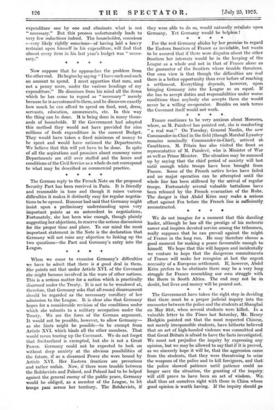When we come to examine Germany's difficulties we have to
admit that there is a good deal in them. She points out that under Article XVI. of the Covenant she might become involved in the wars of other nations. This is a serious matter for a nation which is practically disarmed under the Treaty. It is not to be wondered at, therefore, that Germany asks that all-round disarmament should be regarded as the necesssary corollary of her admission to the League. It is clear also that Germany hopes for a considerable revision of the conditions under which she submits to a military occupation under the Treaty. We see the force of the German argument. It would not be possible, however, to allow Germany— as she hints might be possible—to be exempt from Article XVI. which binds all the other members. That would mean tearing up the Covenant. We do not forget that Switzerland is exempted, but she is not a Great Power. Germany could not be expected to look on without deep anxiety at the obvious possibilities of the future, if as a disarmed Power she were bound by Article XVI. Her Eastern frontiers are precarious and rather unfair. Now, if there were trouble between the Bolshevists and Poland, and Poland had to be helped against the general enemy of the public peace, Germany would be obliged, as a member of the League, to let troops pass across her territory. The Bolshevists, if they were able to do so, would naturally retaliate upon Germany. Yet Germany would be helpless !
* *


























































 Previous page
Previous page